|
|
|

|
|
Sikkim
|

|

|
Sikkim, a small Himalayan State lying between 270 to 280 North Latitude and 880
to 890 East Longitude is the 22nd State of India. It is 7,096 Sq. kms in size yet
has an elevation ranging from 200 meter to 8585 meters above sea level. It’s topography
is dominated by the most majestic mountain chain in the world which includes Khangchendzonga,
world’s third highest mountain-a guardian deity of the Sikkimese.
Surrounded by Tibet in the North, Nepal in the West, Bhutan in the East and Bengal
in the South. Sikkim is rich in biodiversity.
Population of Sikkim comprises of three main ethnic groups Lepcha, Bhutia and the
Nepalese.
|
|
|
|
|
|

|

|
|
History of Sikkim
|

|

|
|
The original inhabitants were the Lepchas or the “raven folks” who came to the area
from Assam and Burma. From the 1200’s the Bhutias or the Tibetan people moved into
Sikkim. They included the Namgyal clan who arrived in the 1400’s and gradually won
political control over Sikkim. In 1642,Phintsok Namgyal (1604-1670) became the first
Chogyal (King).
|
|
|
|
|
|

|

|
|
|

|

|
|
East Sikkim
|

|
Enchey Monastery :-
An important seat of the Nyingmapa order, this 200 year old Enchey Monastery is
built on the site blessed by Lama Drupto Karpo, a tantric master known for his power
of flying.. Every year, around January, ‘CHAM’ or religious masked dance is performed
with great fanfare for two days.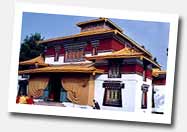
Flower Festival :-
Flower exhibitions are organized around the year at the Flower Show Venue near the
White Memorial Hall Complex, Gangtok. during the spring.
Dodrul Chorten :-
The Dodrul Chorten or stupa was built by the Venerable Trullshi Rinpoche, head of
the Nyimapa order of Tibetan Buddhism, in 1945. inside the Stupa, ther is a complete
mandala set of Dorji Phurba ( Vajra Kilaya), a set of Kangur relics ( Holy Books
), Complete Zung ( mantras)
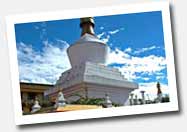 and other religious objects. Around the chorten, which is one of the most important
Stupas in Sikkim, are 108 Mani Lhakor (Prayer wheels).
and other religious objects. Around the chorten, which is one of the most important
Stupas in Sikkim, are 108 Mani Lhakor (Prayer wheels).
Handloom and Handicrafts Centre :-
It is now known as the Directorate of Handicrafts and Handlooms as well as the Government
Institute of Cottage Industries. Started during the time of the Chogyals of Sikkim,
as a venture to protect and propagate the craft and skills of local and village
artisans, it has become on t of the major attractions for people visiting Sikkim
where traditional handcrafts, furniture, handlooms carpets and other products can
be viewed and also purchased.
Namgyal Research Institute of Tibetology (NRIT) :-
The Namgyal Institute of Tibetology, after the late Chogyal of Sikkim, Palden Thondup
Namgyal whose brainchild it was has since become one of the most prestigious depository
of Tibetan literature, rare manuscripts, paintings, thangkas, statues and religious
objects and other works of art and history. Today, it is a renowned worldwide centre
for study of Buddhist philosophy and religion.
Saramsa Garden :-
About 14 kms from Gangtok is the Saramsa Garden, the home of Sikkim's most exotic
orchids and other rare tropical and temperate plants.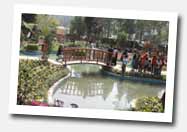 Established and maintained by the Department of Forest, it is an excellent recreation
and picnic spot.
Established and maintained by the Department of Forest, it is an excellent recreation
and picnic spot.
Rumtek Dharma Chakra Centre :-
The Rumtek Dharma Chakra Centre is the seat of the Kagyu order, one of the 4 major
Tibetan Buddhist Sects. Since the late 1960’s , after the arrival of His Holiness
the 16th Gyalwa Karmapa, the centre houses some of the world’s most unique religious
scriptures and religious rare
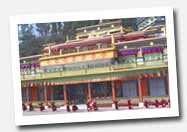 objects. Traditional in design, it is almost an replica of the
original Kagyu Monastery in Tshurpu, in eastern Tibet. It has over 300 centres worldwide
Tibet. It has over 300 centres worldwide. objects. Traditional in design, it is almost an replica of the
original Kagyu Monastery in Tshurpu, in eastern Tibet. It has over 300 centres worldwide
Tibet. It has over 300 centres worldwide.
Jawaharlal Nehru Botanical Garden :-
Very close by to Rumtek Monastery, and maintained by the parks and Gardens unit
of the Forest Department of the Government of Sikkim, the Garden is an enchanting
and soothing experience among the lush green vegetation, rare plants and trees and
certain species of Himalayan flowers and Orchids.
Water Garden :-
Water Garden at Martam Khola is on the 31-A National Highway some 16 kms. south
of Gangtok. It is an ideal spot for picnic with a small swimming pool for children.
Tsomgo Lake
It literally means the “source of the Lake” in the Bhutia language. Just about 40km
away from Gangtok, the capital of State. This serene lake is situated at an altitude
of 3,780 mtrs. The lake is about 1 km long, oval in shape, 15mtrs deep and is considered
sacred by the local people. This placid lake remains frozen during the winter months
upto mid-May.
Between May and August, it is possible to see a variety of flowres bloom, including
the rhododendrons, various species of primulas, blue and yallow poppies, iris, etc.
It is also an ideal habitat of the Red Panda and various species of birds. Open
for both the foreign and Indian nationals. Foreign visitors have to be in a group
of 2 or more and have to apply for the visitors permit through a registered Travel
agency.
Nathula
56 kms from Gangtok is a 'Nathula' Pass at an altitude of 14,200 ft. bordering between
India and China in the Tibetan Plateau. It is one of the highest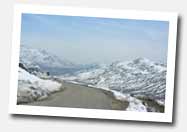 motorable roads and richly covered by many varities of alpine flora and fauna. A
tranquil place to visit. Nathula is open only for Indian nationals on Wednesdays,
Thursdays, Saturdays and Sundays. The visitors have to get the permit to visit the
place by applying to the Tourism Department through a registered Travel Agency.
motorable roads and richly covered by many varities of alpine flora and fauna. A
tranquil place to visit. Nathula is open only for Indian nationals on Wednesdays,
Thursdays, Saturdays and Sundays. The visitors have to get the permit to visit the
place by applying to the Tourism Department through a registered Travel Agency.
Tashi View Point
Situated along the Noth Sikkim Highway, it is only 8kms from Gangtok. From this
point
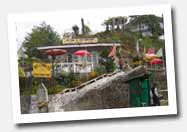 you get a breathtaking view of Mt. Kang-chen-Dzongaand Mt. Siniolchu, one of the
most graceful peaks in the world. Ideal time to visit is early in the morning.
you get a breathtaking view of Mt. Kang-chen-Dzongaand Mt. Siniolchu, one of the
most graceful peaks in the world. Ideal time to visit is early in the morning.
|
|
|
|
|
|

|

|
|
|
|
|